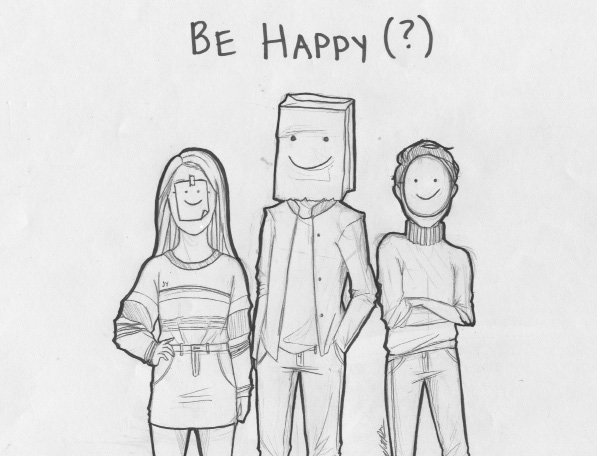The Value of Being Positively Negative

Life is absolutely perfect for every student at CHS. Everyone does well in school, has tons of friends, and does what they enjoy. The key to happiness is positivity, so just be happy! Turn that frown upside down CHS because there is no excuse to not be smiling. It is common knowledge that every person has their own personal struggles; however, everyone is expected by society to be consistently happy, or at least act like they are.
Picture a girl walking down the hallway, crossing her arms and frowning. Instantly, an acquaintance of hers runs up to her and tells her to “Smile more, grumpy!” The girl gives a sarcastic smile, forces laughter. While she was crossing her arms, she was really just cold because she forgot to bring a sweater to school and while she appeared to be frowning, she was really just recalling all of the terms she had memorized for the test she had the following period. Often times, people are criticized for not radiating positivity all the time. If someone is complaining or upset, they are advised to keep their negative thoughts to themselves and focus on the good things in life. Social media revolves around displaying one’s best self and when someone decides to break away from the crowd and complain about their life, people are quick to reprimand them for being a negative person. This obsession with positivity is so extreme to the point that any type of negativity is frowned upon, silenced, or simply ignored. People rely too often on optimism and the promise of the happiness that it is expected to provide that they tend to ignore many negative thoughts and feelings. This negative stigma of negativity not only hurts ourselves, but others as well.
In a world where optimism is the key to happiness, there seems to be no room for negativity or pessimism. Unfortunately, telling someone who has just experienced a tragedy or simply experienced turmoil or struggles in their life that they should just focus on positive thoughts and try to be happy does not do anything for them, as good as the intentions may be. According to Tim Huber, director of the Military Counseling Effort, active duty soldiers are encouraged to “soldier on” and “get over it.” Moreover, according to Maj. Gary H. Wynn, a research psychiatrist at Walter Reed Army Institute of Research,about half of soldiers suffering from PTSD do not receive the care they need and some are even denied treatment. Emotions need to be acknowledged for what they are, and not become a form of false happiness. This pressure often causes those to hide their emotions and put forth a front in order to satisfy the need for positive vibes. However, when someone does voice their emotions, they are often labeled as needy or desperate for attention, discouraging them from being honest with themselves and others when they may actually need some sort of help.
A pessimist is a person with an inclination to emphasize adverse aspects, conditions, and possibilities or to expect the worst possible outcome. However, some pessimism can go a long way. In an excerpt from The Upside of Your Dark Side: Why Being Your Whole Self—Not Just Your “Good” Self-Drives Success and Fulfilment written by Todd Kashdan and Robert Biswas-Diener, the authors note, “Negative emotions like anxiety and suspiciousness can act like an attentional funnel that narrows the mind’s eye to important details.” Suspiciousness is associated with negativity; however, it is often times imperative in scrutinizing something to achieve the best possible result. For example, research by Rebecca Mitchell referenced in “The New York Times” found that negativity in a work environment can actually prevent wrong decisions from being made by avoiding agreement too quickly and not focusing on doing something that may not work. It is not that one should believe that everything will go wrong, they should simply act like they will by taking the proper steps to ensure success. A healthy degree of doubt or pessimism is necessary in order perfect any task.
Life should not consist of solely negativity and pessimism, and people should not be ashamed and guilty for lacking a positive attitude when circumstances are far from ideal. It is all about balance. Even though most people prefer to be happy, negative emotions are inevitable and the circumstances that cause them often cannot be wished away with positive thinking. People seem to believe that if they clutch to the safety of positive thinking and try to make everyone around them do the same, that a new or better reality will emerge. Sometimes people do not smile all the time, and perhaps that is because they are sad or maybe it is because they are considering what they want to eat for lunch that day. This idea that humans should be cheery, smiling creatures all the time is completely unrealistic. Smiling and laughing does not always equivocate to happiness, and frowning and crossing your arms does not always mean the person is grumpy. What needs to be recognized is that unrealistic things should not be expected of people, especially since not everyone knows the full story. Optimism may be helpful, but that does not mean that pessimism is useless. It is time that people understand the value of being positively negative.
Hello there! Our goal is to provide relavent, engaging journalism for readers of all ages. Your donation will support the student journalists of the Wolfpacket at Claremont High School, and will allow us to purchase equipment, print our monthly issues, and enter in journalism competitions. We appreciate your consideration!




